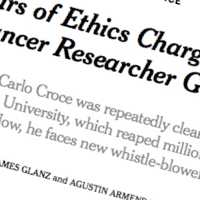Rascals case in brief
In the beginning, in 1989, more than 90 children at the Little Rascals Day Care Center in Edenton, North Carolina, accused a total of 20 adults with 429 instances of sexual abuse over a three-year period. It may have all begun with one parent’s complaint about punishment given her child.
Among the alleged perpetrators: the sheriff and mayor. But prosecutors would charge only Robin Byrum, Darlene Harris, Elizabeth “Betsy” Kelly, Robert “Bob” Kelly, Willard Scott Privott, Shelley Stone and Dawn Wilson – the Edenton 7.
Along with sodomy and beatings, allegations included a baby killed with a handgun, a child being hung upside down from a tree and being set on fire and countless other fantastic incidents involving spaceships, hot air balloons, pirate ships and trained sharks.
By the time prosecutors dropped the last charges in 1997, Little Rascals had become North Carolina’s longest and most costly criminal trial. Prosecutors kept defendants jailed in hopes at least one would turn against their supposed co-conspirators. Remarkably, none did. Another shameful record: Five defendants had to wait longer to face their accusers in court than anyone else in North Carolina history.
Between 1991 and 1997, Ofra Bikel produced three extraordinary episodes on the Little Rascals case for the PBS series “Frontline.” Although “Innocence Lost” did not deter prosecutors, it exposed their tactics and fostered nationwide skepticism and dismay.
With each passing year, the absurdity of the Little Rascals charges has become more obvious. But no admission of error has ever come from prosecutors, police, interviewers or parents. This site is devoted to the issues raised by this case.
On Facebook
Click for earlier Facebook posts archived on this site
Click to go to
Today’s random selection from the Little Rascals Day Care archives….
Click for earlier Facebook posts archived on this site
Click to go to
Today’s random selection from the Little Rascals Day Care archives….
Edenton newspaper shed little light on case
 March 13, 2013
March 13, 2013
In researching his master’s thesis, “Modern Witch Hunts: How Media Have Mishandled Ritual Child-Sex-Abuse Cases,” UNC Chapel Hill journalism student David O. Loomis focused on the inadequate coverage provided by the weekly Chowan Herald in Edenton.
“North Carolina law,” Loomis acknowledged, “prohibits official disclosure of information about ongoing criminal investigations. Under the circumstances, gathering information about questionable interrogations conducted in therapy sessions would be a difficult and complex undertaking for a small reporting staff on a tight budget….”
The comments he elicited from Jack D. Grove, former managing editor of the Herald, reflect the challenge stories such as Little Rascals present tiny newsrooms – and the severely limited guidance they are able to make available to readers in forming opinions:
On his journalistic experience: “I was never a professional reporter.”
On being almost three months behind the Elizabeth City Advance in starting to cover the story: “In a small town like Edenton, reputations are at stake. Reputations are everything in a small town.”
On relations with prosecutors and police: “The district attorney became our prime source…. I didn’t ask questions of the Police Department at all, because I knew what the answers were going to be…. I did ask Brenda Toppin, who I did not know was lead investigator, but I got an uncharacteristic cold shoulder. She said, ‘I can’t comment on an ongoing investigation.’ That was interesting.”
On the newsroom budget: “I could only make long-distance calls when the boss would let me. He never refused. But he had to approve.”
On outside pressure: “I was approached by several influential businessmen who clouded up and rained all over me for putting a (Little Rascals) story on the back page. I said, ‘Go tell Pete Manning (the publisher), don’t tell me.’ These businessmen, almost all parents of Little Rascals children, went into a closed-door meeting with Pete. We never again had a story anywhere but on the front page after that.”
Courtesy of David Loomis, “Modern Witch Hunts” is now available on the Bookshelf of case materials on this website.
What? ‘A hotel that doesn’t take American Express?’
May 17, 2013
From Betsy Kelly’s comments at the ceremony awarding Ofra Bikel the 2007 John Chancellor Award for Excellence in Journalism:
“I stand before you tonight because of Ofra Bikel. She spent many hours with my family and with some of the most hurtful and hateful people. She turned many (viewers) around to believe in the truth. The day she walked into my life I had somebody to hold onto… and she opened the door and she led me out…..”
From Nancy Smith Barrow’s comments:
“I thought: She comes from another planet, she doesn’t speak Southern, what can she do?
“I couldn’t understand why anyone would want to climb into that hole we were in…
“Ofra took us where we were, where hell was raining down, where people who have known us since we were born would cross the street not to meet us….
“Ofra, I owe you for the most precious thing in my life (my sister), you brought her back…..”
From Ofra Bikel’s comments:
 “I was this close to not doing (‘Innocence Lost’). I said (to assistant Rachel Dretzin), ‘Are you crazy? What are we going to do in a little town with a little hotel that doesn’t take American Express?’…. Anyway, we went, and the first day I realized we were staying….
“I was this close to not doing (‘Innocence Lost’). I said (to assistant Rachel Dretzin), ‘Are you crazy? What are we going to do in a little town with a little hotel that doesn’t take American Express?’…. Anyway, we went, and the first day I realized we were staying….
“The whole country was awash in sexual abuse stories, but there was nothing less likely than for Edenton, North Carolina, to be involved in this satanic conspiracy… The town was calm on outside but seething on the inside with these rumors of terrible sexual abuse, started by one kid, then three kids, then 10 kids, then 80 and then close to a hundred… until they decided to close the list….
“(After the last Little Rascals charges were dropped) I was left with two very strong feelings: how many things can go wrong in the justice system…. and what a powerful tool we had in our hands with the television documentary….”
Some journals getting better at correcting mistakes
 March 9, 2017
March 9, 2017
“As a result of complaints, [scientific] journals have been posting notices of problems with Dr. [Carlo] Croce’s papers at a quickening pace. From just a handful of notices before 2013 – known as corrections, retractions and editors’ notices – the number has ballooned to at least 20, with at least three more on the way, according to journal editors….”
– From “Years of Ethics Charges, but Star Cancer Researcher Gets a Pass” by James Glanz and Agustin Armendariz in the New York Times (March 8)
Yet another example of professional journals responding with new vigor to faulty articles.
By contrast, no retraction has ever appeared in those journals that lent credence to testimony by the prosecution’s expert witnesses during the day-care panic. Or perhaps some author or editor still wants to defend the likes of “Stress Responses of Children to Sexual Abuse and Ritualistic Abuse in Day Care Centers” and “Satanic Ritual Abuse: A Cause of Multiple Personality Disorder”?
![]()
Imprisonment ‘without having to prove a thing’
Nov. 23, 2011
“Finally, after eight years, the Little Rascals case is over. We can consign to history what has to be the most bizarre and disturbing episode in the annals of North Carolina law…..
“Never has the state devoted such resources to wrecking lives with such flimsy evidence and unconscionable delays.
“As a case history of mass hysteria, the Edenton story will enrich textbooks for generations. As a cautionary tale of what can happen when otherwise sensible people come under the spell of self-styled victim advocates, one can only hope the memory of Little Rascals will help others stop the next case before it gets out of hand.
“The state’s most effective weapon… was not evidence, but time. By holding (defendants) behind bars month after month, the state managed to inflict enormous punishment… without having to prove a thing.
“As fiction, the Little Rascals story would have strained the combined imaginations of Charles Dickens and Stephen King. As news, it is a chilling example of a judicial system that was unchecked by common sense or common decency.”
– Editorial in the Greensboro News & Record, May 28, 1997
When Gladstone (or whoever) first posited that “Justice delayed is justice denied,” could he have envisioned such a calculated demonstration?











0 CommentsComment on Facebook